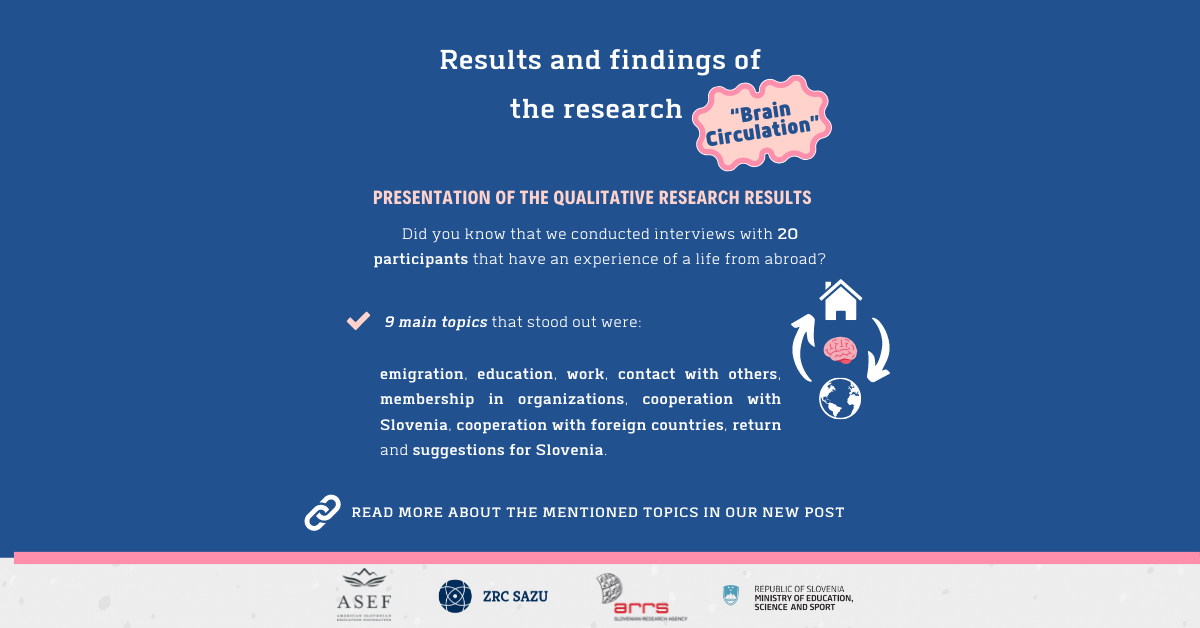
Presentation of the Qualitative Research Results
Promotion of the results and findings of the research TRP 2019 “Brain circulation”
In the past weeks, we shared with you the results of the quantitative part of our research, which we obtained with a survey questionnaire that was answered by 2.036 Slovenians with experience of a life abroad. As part of the qualitative research, we conducted interviews to expand the understanding of the information obtained, where 20 participants with different levels of education in a wide variety of fields from medical and natural sciences, mathematics, engineering, linguistics, law, business, arts and others took part. At the time of the interviews, 13 of the interviewees lived abroad, while seven of them lived abroad in the past and later returned to Slovenia.
Based on the analysis of the interviews, we identified nine main topics: 1) emigration; 2) education; 3) work; 4) contact with others; 5) membership in organizations; 6) cooperation with Slovenia; 7) cooperation with foreign countries; 8) return and 9) suggestions for Slovenia. In this post, we will focus on findings from only some sections.
Often, when an individual goes abroad, we think about the emigration process itself. With the help of interviews, we found that the majority of participants emigrated on their own for various reasons, which are primarily related to the lack of academic opportunities and the insufficient quality of the educational process in Slovenia, where, in their opinion, there is also a lack of connection with an international environment.
It is also interesting to note that most of the research participants’ work abroad is largely in line with their education. Although most of them could do this work in Slovenia as well, the advantages of abroad prevailed. Those who returned to Slovenia after the experience of living in a different country also do work that is consistent with their education, and at the same time they emphasize the policies of other countries that attract educated individuals to their high-profile jobs.
Most of the interviewed persons cooperate with Slovenia. This is made possible by bilateral contracts, connections with Slovenian universities, student work, publishing articles in Slovenian journals and cooperating on an article. The Slovenian embassy and associations also play their role here. But perhaps the most important of all is the presence of personal initiative, so it is not a surprise that the respondents miss the interest from the Slovenian side.
In the conversation about the conditions for returning to Slovenia, the participants mentioned the possibilities of their own and their partner’s employment in Slovenia, the same working conditions as abroad, family contacts and a personal desire to return home. Returnees state similar reasons for coming to Slovenia, while they do not rule out the possibility of returning abroad. Attitudes towards returning to Slovenia are both favorable and unfavorable – if they were to return, they would at least partially want to work abroad.
When we summarize some of the findings of the qualitative part of the research (interviews), we can see a strong connection with the previously presented results from the quantitative analysis (surveys). From the findings, we can conclude that emigration is mostly an autonomous decision of the individual and the result of an accumulation of factors, such as desire to seek better academic and career opportunities. Abroad presents interviewees with favorable conditions for work and life, but they do not rule out the possibility of returning to Slovenia, and at the same time they want to maintain ties with their homeland and cooperate with it from abroad.
Mentioned findings were obtained within the framework of the TRP project “Brain Circulation,” which was carried out between November 1, 2019, and October 10, 2021. The project is partly financed by the Slovenian Research Agency (ARRS) and the Slovenian Ministry of Education, Science and Sport (MIZŠ). Participating research organizations were the ASEF Institute for Education and Research (ASEF) and the Research Center of the Slovenian Academy of Sciences and Arts, Slovenian Migration Institute (ZRC SAZU SMI), with Dr. Dejan Valentinčič as the project leader.

